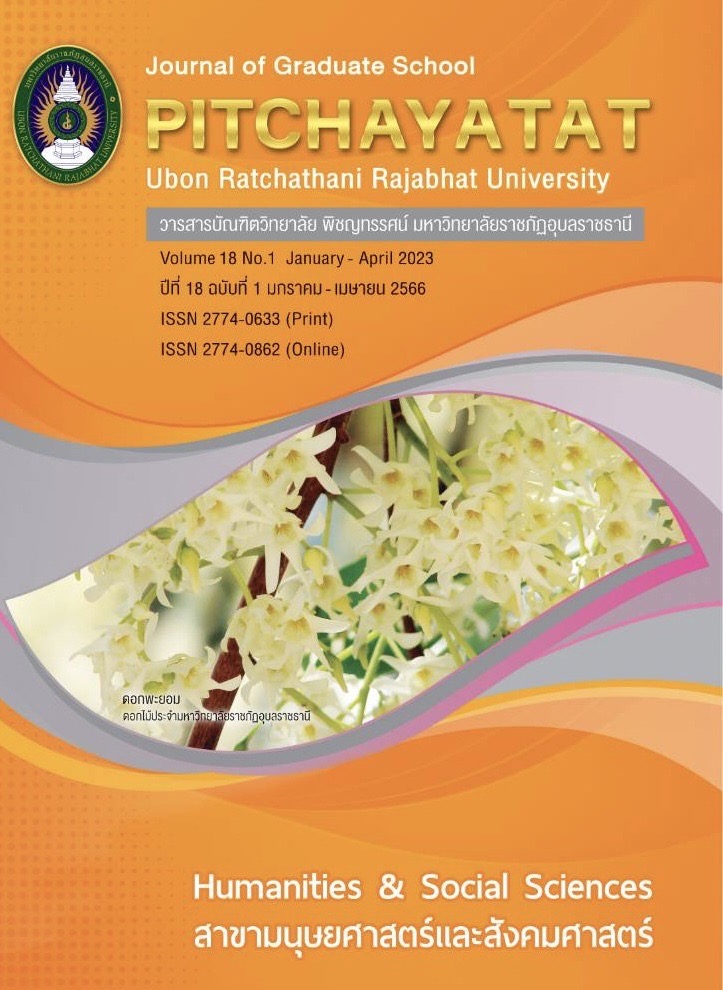ผลการใช้รูปแบบการเรียนรู้แบบผสมผสานโดยใช้โครงงานเป็นฐานร่วมกับการโค้ชเพื่อการรู้คิด ที่ส่งเสริมการคิดวิเคราะห์ สำหรับนักศึกษาระดับปริญญาตรี
คำสำคัญ:
รูปแบบการเรียนแบบผสมผสาน , การเรียนรู้โดยใช้โครงงานเป็นฐานร่วมกับการโค้ชเพื่อการรู้คิด , การคิดวิเคราะห์บทคัดย่อ
การวิจัยนี้มีวัตถุประสงค์เพื่อ 1) เปรียบเทียบการคิดวิเคราะห์ก่อนเรียนและหลังเรียนของผู้เรียนที่เรียนตามรูปแบบการเรียนรู้แบบผสมผสานโดยใช้โครงงานเป็นฐานร่วมกับการโค้ชเพื่อการรู้คิดที่ส่งเสริมการคิดวิเคราะห์สำหรับนักศึกษาปริญญาตรี 2) เปรียบเทียบผลสัมฤทธิ์ทางการเรียนของผู้เรียนที่เรียนตามรูปแบบการเรียนรู้แบบผสมผสานโดยใช้โครงงานเป็นฐานร่วมกับการโค้ชเพื่อการรู้คิดที่ส่งเสริมการคิดวิเคราะห์ สำหรับนักศึกษาปริญญาตรี 3) ศึกษาความพึงพอใจของผู้เรียนที่เรียนตามรูปแบบการเรียนรู้แบบผสมผสานโดยใช้โครงงานเป็นฐานร่วมกับการโค้ชเพื่อการรู้คิดที่ส่งเสริมการคิดวิเคราะห์สำหรับนักศึกษาปริญญาตรี ตัวอย่างที่ใช้ ได้แก่ นักศึกษาสาขาวิชาการจัดการโลจิสติกส์ คณะเทคโนโลยีอุตสาหกรรม มหาวิทยาลัยราชภัฏอุบลราชธานี ที่ลงทะเบียนเรียนวิชาการบริหารโครงการ ภาคเรียนที่ 1 ปีการศึกษา 2564 จำนวน 28 คน คัดเลือกตัวอย่างด้วยวิธีแบบเจาะจง เครื่องมือที่ใช้ ได้แก่ แบบวัดการคิดวิเคราะห์ แบบวัดผลสัมฤทธิ์ทางการเรียน และแบบสอบถามความพึงพอใจ สถิติที่ใช้ ได้แก่ ค่าเฉลี่ย ส่วนเบี่ยงเบนมาตรฐาน และการทดสอบทีแบบกลุ่มสัมพันธ์
ผลการวิจัยพบว่า
- ผลการเปรียบเทียบการคิดวิเคราะห์ก่อนและหลังการดำเนินกิจกรรม โดยรวมแล้วความสามารถในการคิดวิเคราะห์ของนักศึกษาที่เรียนโดยใช้รูปแบบการเรียนรู้แบบผสมผสานโดยใช้โครงงานเป็นฐานร่วมกับการโค้ชเพื่อการรู้คิดที่ส่งเสริมการคิดวิเคราะห์ หลังเรียนสูงกว่ากับก่อนเรียน อย่างมีนัยสำคัญทางสถิติที่ระดับ .01
- ผลสัมฤทธิ์ทางการเรียนของผู้เรียนที่เรียนตามรูปแบบการเรียนรู้แบบผสมผสานโดยใช้โครงงานเป็นฐานร่วมกับการโค้ชเพื่อการรู้คิดที่ส่งเสริมการคิดวิเคราะห์สำหรับนักศึกษาระดับปริญญาตรี การทดสอบก่อนเรียนและหลังเรียนของนักศึกษาจำนวน 28 คน มีคะแนนค่าเฉลี่ย เท่ากับ 18.57 คะแนน และ 30.19 คะแนน คะแนนส่วนเบี่ยงเบนมาตรฐาน เท่ากับ 2.77คะแนน และ 3.22 คะแนน เมื่อเปรียบเทียบระหว่างคะแนนก่อนและหลังเรียน พบว่า คะแนนสอบหลังเรียนของผู้เรียนสูงกว่าก่อนเรียนอย่างมีนัยสำคัญทางสถิติที่ระดับ .01
- ผลการศึกษาความพึงพอใจของผู้เรียนต่อรูปแบบการเรียนรู้แบบผสมผสานโดยใช้โครงงานเป็นฐานร่วมกับการโค้ชเพื่อการรู้คิดที่ส่งเสริมการคิดวิเคราะห์สำหรับนักศึกษาระดับปริญญาตรี ผู้เรียนอยู่ในระดับพึงพอใจมากที่สุด (x̅ = 4.65)
เอกสารอ้างอิง
ถนอมพร เลาหจรัสแสง. Designing e-Learning หลักการออกแบบและการสร้างเว็บเพื่อการเรียนการสอน. กรุงเทพฯ: อรุณการพิมพ์, 2545.
ถวัลย์ มาศจรัส. นวัตกรรมทางการศึกษา. กรุงเทพฯ: ธารอักษร, 2550.
ทิศนา แขมมณี. รูปแบบการเรียนการสอน : ทางเลือกที่หลากหลาย. พิมพ์ครั้งที่ 7. กรุงเทพฯ: จุฬาลงกรณ์มหาวิทยาลัย, 2554.
ทิศนา แขมมณี. ศาสตร์การสอน : องค์ความรู้เพื่อการจัดการกระบวนการเรียนรู้ที่มีประสิทธิภาพ. กรุงเทพฯ: สำนักพิมพ์จุฬาลงกรณ์มหาวิทยาลัย, 2548.
นิภาพร ช่วยธานี และธเนศ สินธุ์ประจิม. การพัฒนากิจกรรมการเรียนรู้โดยใช้โครงงานเป็นฐานร่วมกับภูมิปัญญาท้องถิ่นเพื่อส่งเสริมทักษะการทำงานร่วมกันสำหรับนักศึกษาปริญญาตรี. คณะวิทยาศาสตร์และเทคโนโลยีการประมง : มหาวิทยาลัยเทคโนโลยีราชมงคลศรีวิชัย, 2563.
พรรณี เกษกมล. ก่อนจะคิดเป็น ต้องฝึกคิดก่อน. กรุงเทพฯ: มหาวิทยาลัยธุรกิจบัณฑิตย์, 2558.
พิมพันธ์ เตชะคุปต์. การจัดการเรียนรู้ในศตวรรษที่ 21. กรุงเทพฯ: จุฬาลงกรณ์มหาวิทยาลัย, 2557.
ไพฑูรย์ สินลารัตน์. เติบโตเต็มตามศักยภาพสู่ศตวรรษที่ 21 ของการศึกษาไทย. กรุงเทพฯ: จุฬาลงกรณ์มหาวิทยาลัย, 2557
รักชนก โสภาพิศ. “การพัฒนารูปแบบการเตรียมความพร้อมการฝึกประสบการณ์วิชาชีพสำหรับนักศึกษาสาขาวิชาการจัดการท่องเที่ยว,” Veridian E-Journal SU. 4, 1 (พฤษภาคม-สิงหาคม 2554): 468-469.
วิจารณ์ พานิช. ครูเพื่อศิษย์ สร้างห้องเรียนกลับทาง. กรุงเทพฯ: เอสอาร์ปริ้นติ้งแมสโปรดักส์ จำกัด, 2556.
ศิริพล แสนบุญส่ง และสมคิด แซ่หลี. “ผลการจัดการเรียนการสอนแบบผสมผสานโดยใช้กระบวนการเรียนรู้โครงงานเป็นฐานเพื่อส่งเสริมผลงานสร้างสรรค์ และทักษะการทำงานร่วมกันเป็นทีมของนักศึกษาคณะครุศาสตร์สาขาวิชาคอมพิวเตอร์ศึกษา,” บัณฑิตศึกษา มหาวิทยาลัยราชภัฏวไลยอลงกรณ์ ในพระบรมราชูปถัมภ์.
, 3 (กันยายน–ธันวาคม 2560):
สุภาณี เส็งศรี. การพัฒนาการเรียนการสอนทางไกลในสถาบันอุดมศึกษา. วิทยานิพนธ์ดุษฎีบัณฑิต จุฬาลงกรณ์มหาวิทยาลัย, 2543.
สังคม ไชยสงเมือง. การพัฒนาระบบการเรียนการสอนแบบผสมผสานโดยใช้โครงงานเป็นฐานเพื่อส่งเสริมทักษะการแก้ปัญหาและทักษะการใช้เทคโนโลยี สำหรับนักเรียนชั้นมัธยมศึกษาปีที่ 3 สังกัดองค์การบริหารส่วนจังหวัดมหาสารคาม. วิทยานิพนธ์ปรัชญาดุษฎีบัณฑิต มหาวิทยาลัยมหาสารคาม, 2560.
อุดมเดช ทาระหอม. การพัฒนารูปแบบการเรียนรู้แบบควอนตัมออนไลน์ตามสไตล์การเรียนรู้ที่ส่งเสริมความสามารถในการคิดวิเคราะห์ วิิทยานิพนธ์ปรัชญาดุษฎีบัณฑิต มหาวิทยาลัยราชภัฏมหาสารคาม, (2559).
Abruscato, J. Teaching children science: A discovery approach. 5th ed. Needham Heihhts, MA : Allym and Bacon, 2000.
Bernie, Trilling and Charles Fade. 21 st Centurt Skills : Learning for Life in Our Times. U.S.A.: Jossey-Bass A Wiley Imprint, 2009.
Biological Science Curriculum Study. BSCS Sciencs: An Inquiry Approach. Dubuque. IA: Kendall/Hunt, 2006.
Bloom, Benjamins. Human Characteristics and school Learning. New York: Mc Graw-Hill Book, 1976.
Fleming, Zhang. Teaching and Learning Styles: VARK Strategies. Honolulu Community College, 2001.
Lenschow, A. Institutetional and policy change in the European community: Variations in Environmental Policy intergration. Doctoral dissertation, Department of Politics. New York: New York University, 1996.
Ndon, Lino et al. "Development and Use of an Activity Model Based on Structured Knowledge: A Music Teaching Support System," 2017 IEEE International Conference on Data Mining Workshops (ICDMW), New Orleans, Louisiana, USA, 2018, pp. 584-89.doi:10.1109/ICDMW. 2017.82, (2010).
ดาวน์โหลด
เผยแพร่แล้ว
รูปแบบการอ้างอิง
ฉบับ
ประเภทบทความ
สัญญาอนุญาต
ลิขสิทธิ์ (c) 2023 วารสารบัณฑิตวิทยาลัย พิชญทรรศน์ มหาวิทยาลัยราชภัฏอุบลราชธานี

อนุญาตภายใต้เงื่อนไข Creative Commons Attribution-NonCommercial-NoDerivatives 4.0 International License.
บทความทุกเรื่องได้รับการตรวจความถูกต้องทางวิชาการโดยผู้ทรงคุณวุฒิภายนอกอย่างน้อย 3 คน ความคิดเห็นในวารสารพิชญทรรศน์เป็นความคิดเห็นของผู้นิพนธ์มิใช่ความคิดเห็นของผู้จัดทำ จึงมิใช่ความรับผิดชอบของวารสารพิชญทรรศน์ และบทความในวารสารพิชญทรรศน์สงวนสิทธิ์ตามกฎหมายไทย การจะนำไปเผยแพร่ต้องได้รับอนุญาตเป็นลายลักษณ์อักษรจากกองบรรณาธิการ





